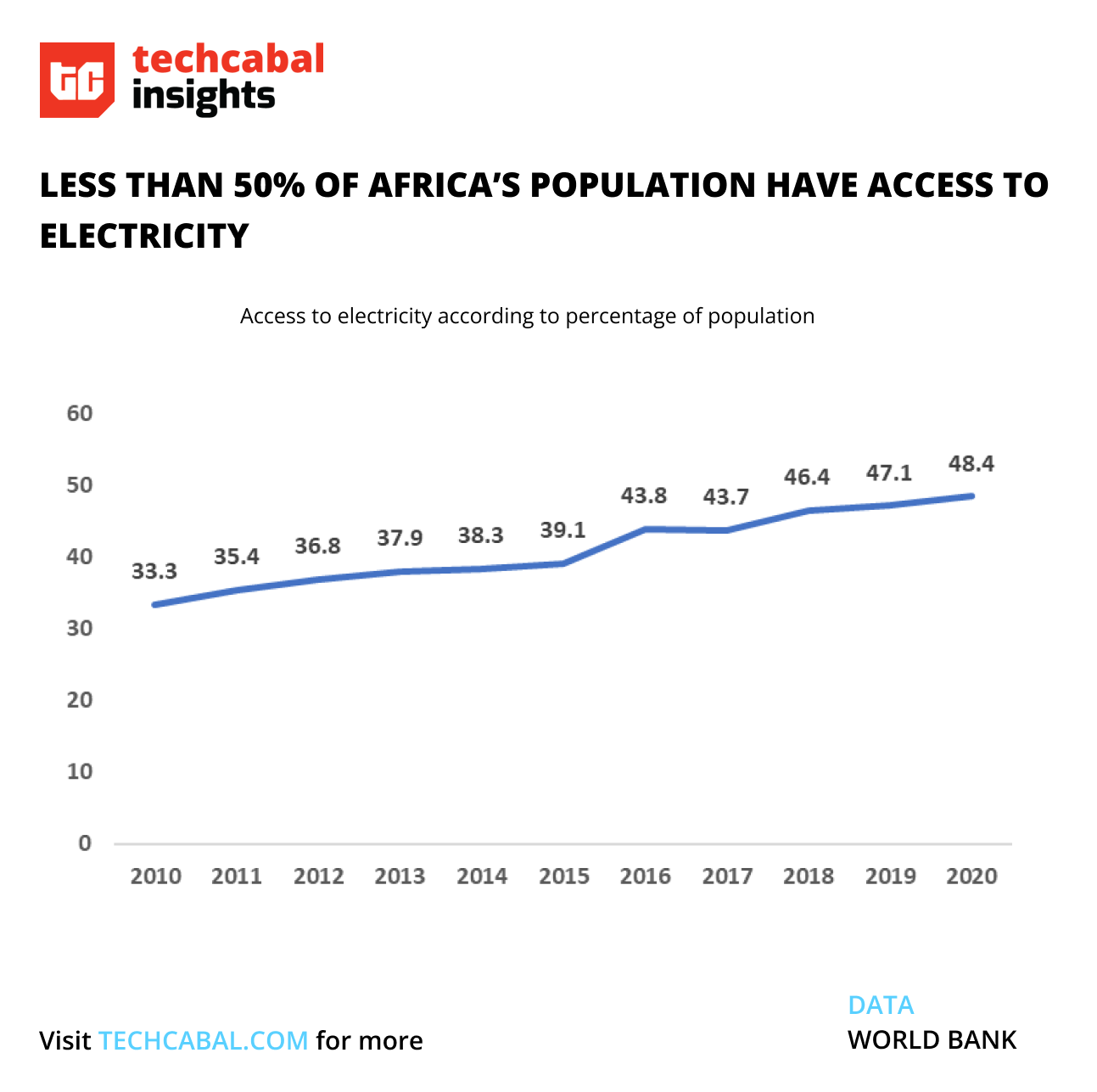6th November 2022
Next Wave: Africa’s power deficit is at odds with its digital economy goals

Photo by NASA on Unsplash
After a brief hiatus, we’re back with our series on Africa’s digital economy and the hard-to-ignore physical, human and institutional components that make up this ecosystem. If you missed the previous editions, please find them here, here, here, and here.
Last week’s guest contribution is also an important way to look at the digital economy from an investment perspective. After you’re done reading this, come back to it here.
Today the Egyptian resort of Sharm El-Sheikh comes alive as 30,000 people and 120 global leaders gather for the 27th United Nations Climate Change conference. The host—Egypt—and international media have described this gathering as a watershed moment" for climate negotiations. In light of the divergence from policy and policy-in-practice statements since the last conference, a 'watershed moment' is a too-nice way to describe the Sharm El-Sheikh event.
The truth is that the West can afford to be flippant about meetings like these. For Africa, however, COP27 should be more than another "estacode" event. Africa is undergoing rapid digital transformation in many ways. While the energy needs of industrialisation are well understood, the conversation tends to skip over how much energy is required to support this growing digital ecosystem to becomae a truly inclusive digital economy.
To truly digitise its economies, Africa must address its power issues. And energy is one of the core physical components of a digital ecosystem. At the UN climate conference and at home, African representatives need to emphatically address the continuing need for energy to support the continent's goal for inclusive digital economies.
The rising demand for electrical power to support digital inclusion goals and the consequent pressure on existing energy infrastructure must balance against a costly transition to cleaner energy sources. As Africa seeks to integrate its parallel informal and formal economies through digitalisation, the continent will require significant investment in power.
In this edition of Next Wave, we discuss energy's fundamental role in Africa's plans for digitalisation and scaling digital inclusion on the continent.
Fuel for digital living
Since Edison turned on the generators at Pearl Street Station, we have been moving towards a more electrified economy. The advent of digital technology has led to an even greater demand for electricity. In Africa, for example, the rapid adoption of digital mobile technologies since the 2000s coincides with electrification on the continent.
Between 2000 and 2012, the pace of electrification in Africa almost tripled. By 2014, electrification efforts surpassed population growth for the first time.1
Despite commendable growth, millions of Africans live without power every day. According to the International Energy Agency, about 590 million people, or roughly half of Africa's population, still do not have access to electricity.

Mobolaji Idowu / TechCabal Insights.
From the early days of Africa's digital revolution, this inadequate supply of electrical power has remained a challenge for telecom infrastructure companies. It remains a high operating cost and blocker to expanding digital inclusion. Hundreds of thousands of towers across the continent are in areas without access to reliable electricity grids.2 As a result, a telecom tower site powered 24/7 by a diesel generator can consume about 28,000 litres of diesel every year, making up 30% or higher of operating costs.
Telecom operators are experimenting with solar power. But as one telecom executive revealed, mini-solar solutions are prone to vandalism and thus cannot be relied upon consistently. His company has abandoned mini-solar solutions
While mobile networks cover about 83% of Africa's population, only about 22% of the population have internet access, according to data from the GSM Association.3 According to the World Bank, only 30% of people living south of the Sahara use the internet,4 leaving roughly 800 million individuals outside the reach of the digital economy. Especially as the digital economy becomes synonymous with the internet economy.
While the pandemic accelerated digital adoption, the economic disruption placed many power grids under pressure, further threatening access to the digital economy. Two main drivers of this usage gap is access to power and affordability of internet-enabled devices and data bundles. Since so many people do not use the internet where it is available, the cost fot those who use it higher, which ironically contributes to why so many do not use the internet or use it sparingly. PayGo solar was a much-vaunted solution in hopes that it would solve the power problem at least in homes, but it has failed to deliver.
So far, we have only talked about the costs of a digital economy from a telecoms perspective. Adding other components like data centres makes the picture even starker. While there is disagreement on whether current demand in Africa necessitates the construction of more data centres, everyone agrees that a rise in demand is imminent.
Within that context, Africa will need 1,000MW of data centre capacity to spread digital services across the continent. The continent currently has about a quarter of this capacity.5
Africa's COP27 participants need to consider that "with electric power grids under distress and long-term energy supplies in question, data centres may find themselves making more use of diesel backup power in the coming months."6
Micro-grids and digital energy
Electrical power is experiencing digitisation on the distribution level.7 Digitalised power grids incentivize power consumers to adopt cleaner energy via net metering. Digital grids may also help utilities maintain grid stability and reliability, monitor the grid and identify failures, reduce operations and maintenance costs, optimize and forecast energy production and extend the operational lifetime of assets.
Data centers in Africa appear to be paying much attention to this. Last month Africa Data Center Association published a whitepaper detailing why microgrids that can coordinate different energy sources (including power from the grid and renewable sources) to optimize costs and provide power stability should be adopted.
Data centers are large energy off-takers. Policymakers should recognize the potential economic impact on energy utilities when centers have to "island" themselves to prevent public grid outages.
In A data centre roadmap for Africa, I wrote, "Without more involved government action at national, regional, and local levels, Africa's power, land, and water requirements for data centre facilities at any meaningful scale will be difficult to achieve."
African policymakers must recognize the centrality of reliable power—at the grid level—for digital transformation at COP27 and beyond. Managing the status quo or relying on PayGo solar to recharge phones will not cut it.
References
[1] Rim Berahab, “Is Digitalization the Future of Energy in Africa?” Policy Center for the New South, 2018, https://www.policycenter.ma/opinion/digitalization-future-energy-africa
[2] “The future for African telecom tower power” Communications Africa, 2018, https://www.communicationsafrica.com/power/the-future-for-african-telecom-tower-power
[3] “The State of Mobile Connectivity Report 2022” GSMA, 2022, https://www.gsma.com/r/wp-content/uploads/2022/10/The-State-of-Mobile-Internet-Connectivity-Report-2022.pdf
[4] World Bank data (2020), https://data.worldbank.org/indicator/IT.NET.USER.ZS?locations=ZG
[5] “Data centres are taking root in Africa” The Economist, 2021, https://www.economist.com/middle-east-and-africa/2021/12/04/data-centres-are-taking-root-in-africa
[6] Peter Judge, “Backup Comes to the Fore” Data Center Dynamics, 2022, https://www.datacenterdynamics.com/en/analysis/backup-comes-to-the-fore/
[7] “Digitalization of Energy Systems,” Bloomberg NEF, 2017, https://about.bnef.com/blog/digitalization-energy-systems
We'd love to hear from you
Psst! Down here!
Thanks for reading The Next Wave. Subscribe here for free to get fresh perspectives on the progress of digital innovation in Africa every Sunday.
Please share today’s edition with your network on WhatsApp, Telegram and other platforms, and feel free to send a reply to let us know if you enjoyed this essay
Subscribe to our TC Daily newsletter to receive all the technology and business stories you need each weekday at 7 AM (WAT).
Follow TechCabal on Twitter, Instagram, Facebook, and LinkedIn to stay engaged in our real-time conversations on tech and innovation in Africa.

Abraham Augustine,
Senior Writer, TechCabal.








